In one of Greece’s struggling refugee camps, food is scarce but distrust is plentiful.
IDOMENI, Greece—
It’s lunchtime at the Idomeni refugee camp, where each meal bleeds into the next.
Hundreds of people stand under the beating Mediterranean sun, waiting to file through a metal gate for a hot meal that won’t satisfy anyone.
The desperation is palpable, but so is the cognitive dissonance. This is Europe? Syrians ask, again and again. Mustaheel. Impossible.
But it is.
It’s been nearly two months since Macedonia closed its border when I arrive in late April at Idomeni, an otherwise nondescript Greek border town now home to a squalid and sprawling camp of 12,000 people or so. Many are left with little but a donated tent and faith that the barbed-wire door to a war-free future will open, eventually. Everything is scarce: money, medicines, shelters, bathrooms, and, of course, food.
One NGO, Praxis, says they serve 8,000 meals a day; another NGO, Oikopolis, says they provide more than 3,000 meals, and the Red Cross says they distribute 500 to 1,500 care packages a day. But there never seems to be enough, and it’s never what people want.
By 2 p.m. frustration is coming to head at the front of the “Zona A” lunch line. It’s tense times like these when food takes on a primal power.
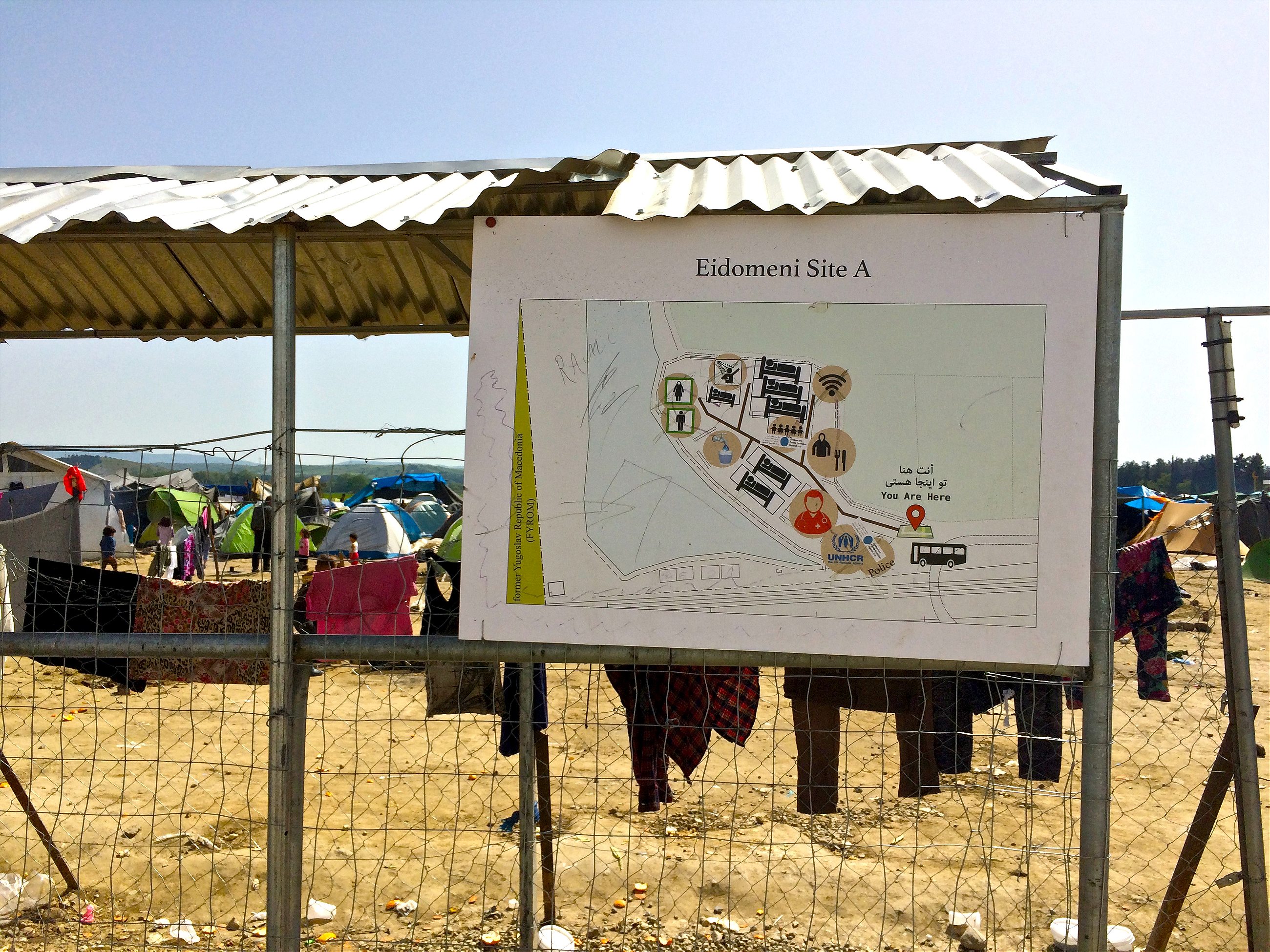
“You!” A tall Greek woman, the shift coordinator, shouts at a hunched old woman who dared to take two rolls of bread. “Here! Never!” She claps her hands for emphasis.
“My friend, my friend,” children and women implore in English, hands out for another orange.
“No!” she shouts.
A young, slim Syrian male shows her an orange with a gash.
“This is bad. Another one!” he demands in English.
“No. You did that to it,” she retorts.
He denies so and goes for a new one. A tussle ensues as he angrily throws the orange away.
She yells at him in Greek. He yells back in Arabic.
“You. Sex!” he adds in English.
The food line stops. Kids gather to watch, clinging on the wire. An Arabic speaker on staff comes out to quiet and appeal to the crowd.
Let the Syrians cook. We would do it better
Considering the camp’s poor conditions, it’s no surprise that Hena, 26, thinks the food makes her sick. The United Nations, or whoever is in charge, must be sending bad food so they’ll leave, she believes. It makes sense when the only U.N. she’s known has seemingly lied to her all along, issuing empty calls for the fighting to stop at home and offering false claims that she would be cared for here.
So now, past where the Zone A food line extends, past where the NGO containers-turned-offices end, over the railway where Greek police and silent protestors with English signs often face off, to the left of the nameless main road where the lucky buy ice cream and cigarettes, past the big tents and portable bathrooms, Hena and her group cook what they can: potatoes, pasta, rice.
Hena stands tall in a red dress and patterned hijab. She has two kids to feed, a husband with a damaged hand, and third child on the way. She’s from Aleppo, one of Syria’s many culinary centers, and has a practical solution to the camp’s food tensions: “Let the Syrians cook. We would do it better.”
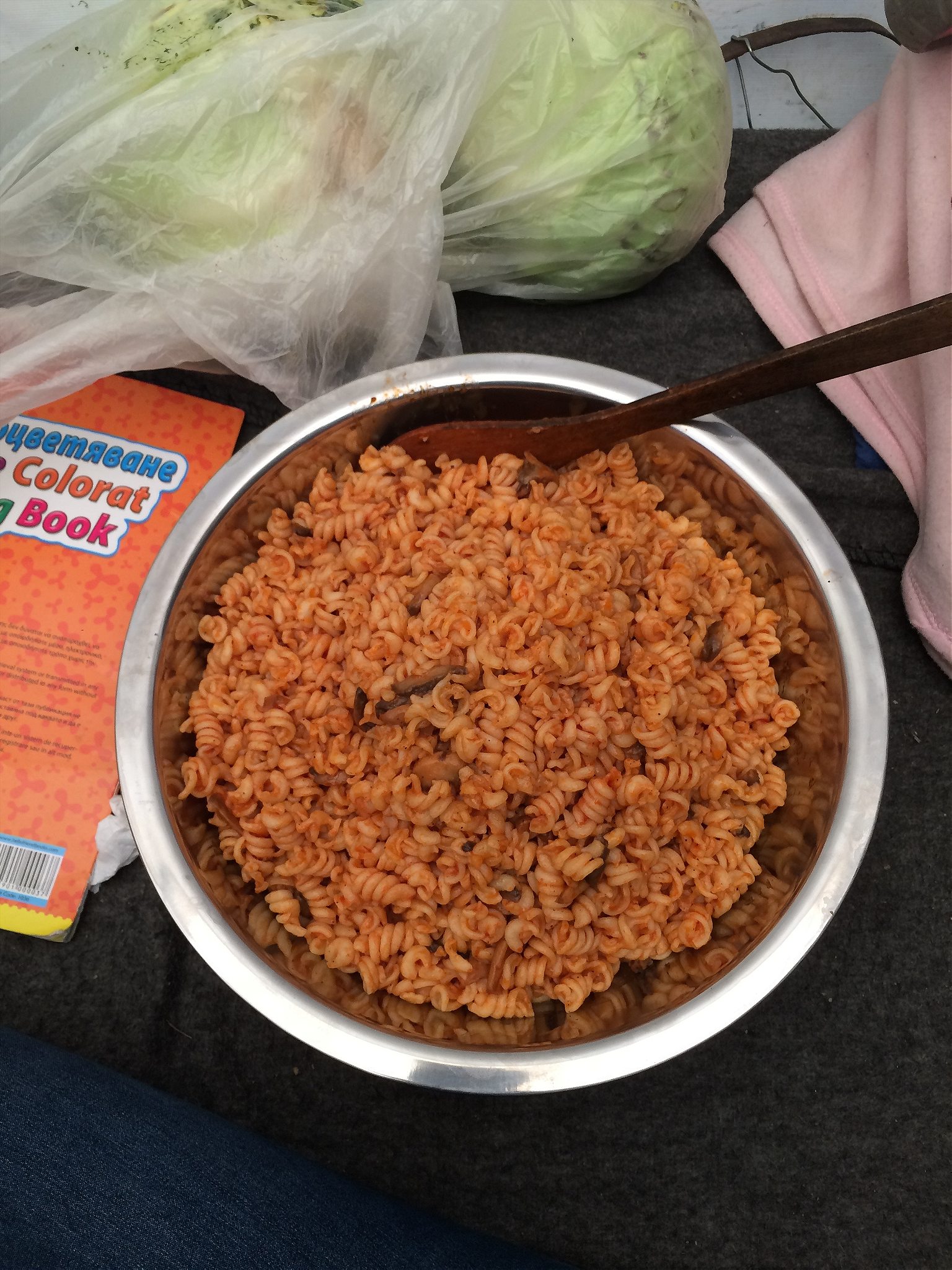
Back in Syria, they were poor and still had meat twice a week. Aleppo’s known for its kebabs, she reminds the crowd around us with her wide smile. But that was another life. That was before Bashar al-Assad fired on peaceful protestors and sent the uprising into disarray, before the so-called Islamic State entered the fray and Syria became everyone’s war. Before the bombs, the blood, the boats, and the final arrival here, just in time for fortress Europe’s borders to shut.
Hena hadn’t planned for this. No one, apparently, did. In early March, when the border closed, cutting off the Balkan route to Germany, it was sandwich after sandwich in Idomeni as people waited there in confusion. The border didn’t budge. In the meantime, a humanitarian crisis brewed as distrust and misinformation in the informal camp grew. Around Greece, more than 50,000 refugees found themselves suddenly stuck, many of them cut off from their families who had already made it to western Europe. In Idomeni, rumors swirl about everything: when the border will open, the condition of new military camps, the cost of smuggling.
Hena still gets stomachaches from the foreign-tasting hot meals served in plastic take-a-way bowls. It’s never enough for her kids, and waiting long hours in the hot sun and crowds, especially as a woman… mustaheel. Impossible.
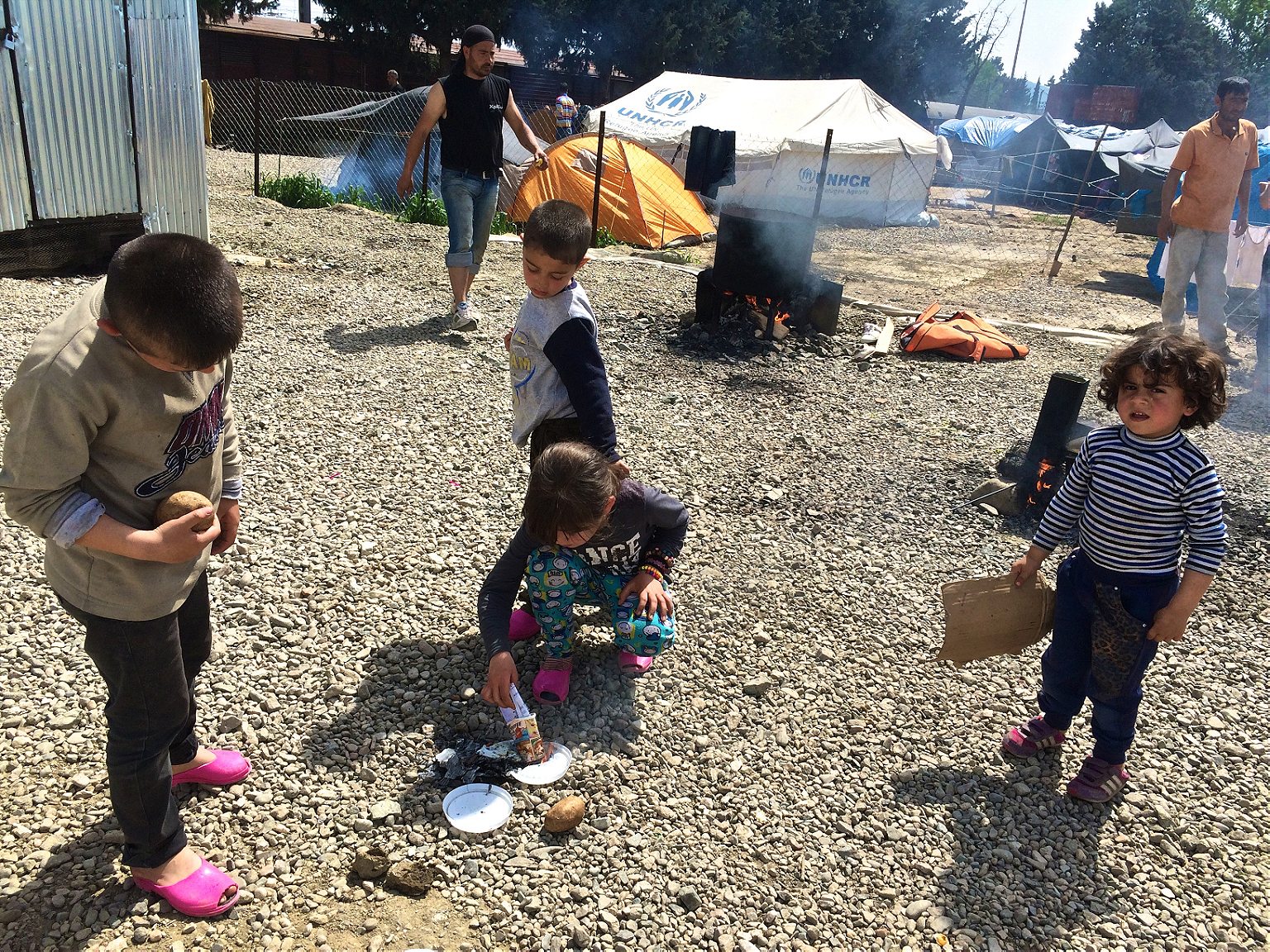
A Doctors Without Borders (MSF) field coordinator, Emmanuel Massart, tells me there was only one spoiled food incident at Idomeni: part of a meal distributed by a Greek NGO was delivered rotten and was soon thrown out. The stomachaches residents of the camp complain of could also be a psychosomatic sign of stress, a reaction to physical and psychological traumas, which everyone here has experienced.
The Greek military planes flying overheard don’t help: people here have only known planes like that to drop bombs. Neither does the camp’s informal status. It’s been an uphill battle for NGOs to deliver aid when they can’t plan long-term. Greek authorities are constantly threatening to clear Idomeni. In the meantime, MSF has had to technically rent the land from a local farmer. That means no digging pipes for bathrooms and showers and no stable hospitals, housing, electricity, or cooking counters. That means infections, rashes, and nameless pains, dwindling funds—for those who had any to begin with—and the bare minimum of basics like milk and medicines.
The Greeks, of course, never asked for any of this. The country was already on the brink of economic collapse when the refugees—Syrians, Afghans, Iraqis, Eritreans—started to flow in. Still, Greeks and visiting volunteers do their part and more. Around the mainland and islands, people offer clothes, rooms, and meals. “I want to thank the Greek people, make sure you say that,” insists Hasna, a slim woman in her sixties who is from Quneitra.
But wars keep raging and people keep coming. Thousands of refugees have set up tents in squares around Athens. Promises of resettlement have fallen flat. In March, the European Union and Turkey announced a contentious deal, the kind that doesn’t even look good on paper: they’d detain new arrivals on Lesbos Island and send back those who didn’t qualify for refugee status.
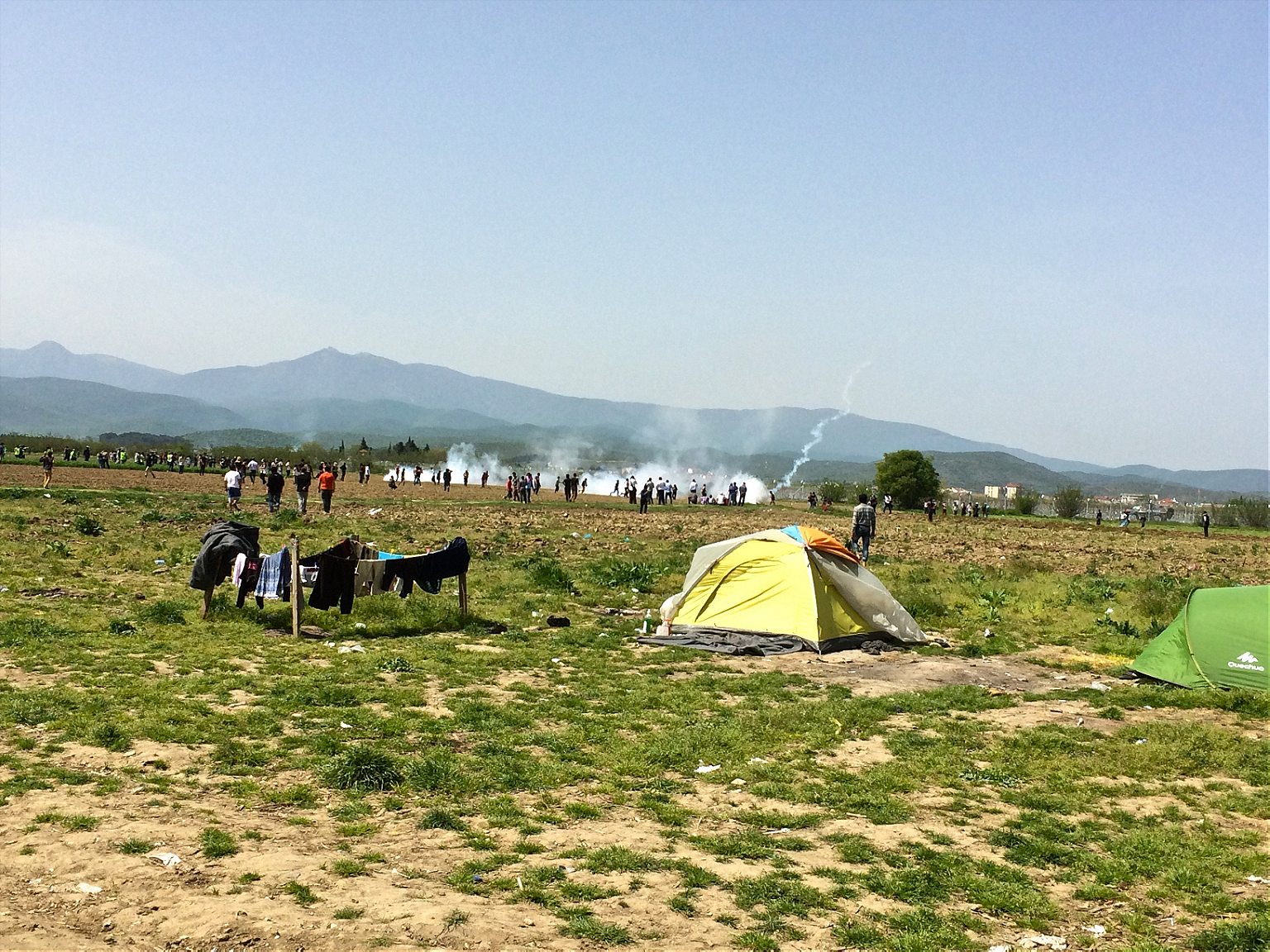
Back in Idomeni, it’s lunchtime again and Essam, 33, is hustling. He’s lifting bags for another NGO consortium that prepares a daily meal on site. In exchange, he’s hoping for an extra bag of bread and tomatoes for his three kids and wife.
Essam has the build of a swimmer, which he was before the war, and three shrapnel wounds in his leg. He’s also a food guy. He keeps photos on his phone of the kebabs he used to cook in his hometown, Raqqa. He doesn’t like the volunteers’ food: no one does, he confides. Still, they’re not looking for a Syrian sous chef, though he’s very qualified.
Massart, the MSF coordinator, tells me they’re pushing for less prepared food and more packaged dry goods and cooking gear in order to allow people to cook for themselves. For now, the Hellenic Red Cross distributes packages of essentials marked with expiration dates and others make tent-visits to the aged and disabled. But several women insisted they had received expired cans of food from volunteers.
In the meantime, Essam’s savings are dwindling as he buys what vegetables and cans he can from Greek vendors or the camp’s few businessmen, like Abu Toni, a round Syrian Kurdish divorcee who had the means to pool savings together with two other families and turn a tent into a mini-market.
Essam and his wife, Affaf, 27, don’t have those kind of means anymore. After months of saving, it cost them $3,000 USD to be smuggled by car out of ISIS-controlled Raqqa. The turning point for Essam was when three missiles fell on the sweets shop he was then working in. He only lived because the third bomb didn’t explode. It was then that his eldest child, six-year-old Ghazal, told him they had to go.
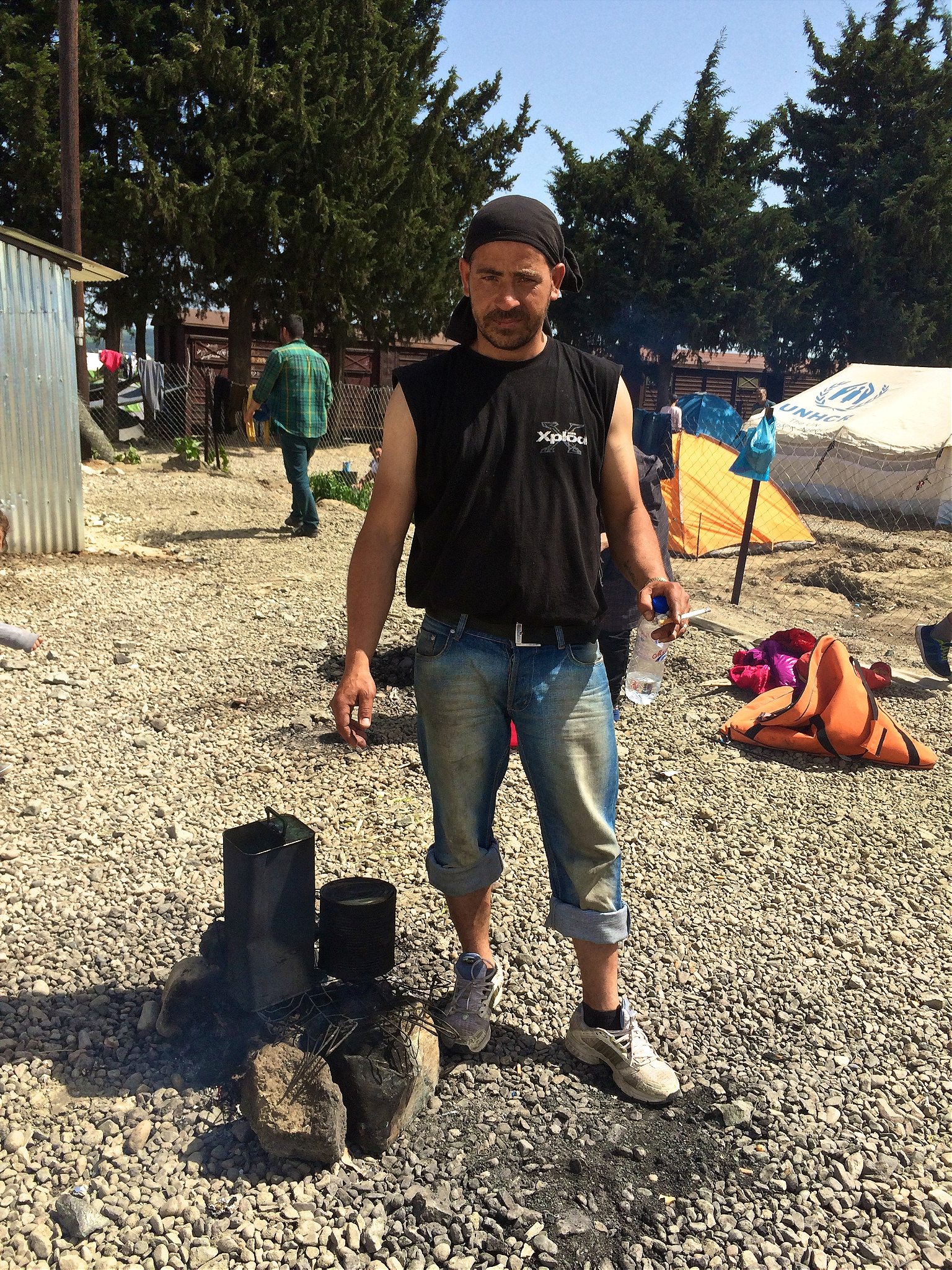
So they started selling off their jewelry and three months ago made their exodus. Then they had to pay more for the bilm, the dingy “boat of death” Turkish smugglers cram with people and send across the Mediterranean. And then they got stuck. Essam has two brothers already in Germany and one in Norway, but they’ll go anywhere that’s safe. “In Syria, it’s a fast death. In Idomeni, a slow one,” he says, a common Idomeni refrain .
The first day I meet Essam he insists I come see his youngest child, eight-month old Rena, lying still on Affaf’s lap in their tiny, partly partitioned corner “room” in a large tent that houses over two hundred people. Four days earlier teargas and rubber bullets filled much of the camp after a rumor the border was opening spurred hundreds to rush it. Rena’s had trouble breathing since. She needs stage-two dry milk, but they can only find types one and three. Praxis distributes dried milk, but you have to wait in long lines for a small bottle.
Still, Affaf and Essam continue to welcome me back. One afternoon, a petite, shorthaired Greek woman hired to clean the portable bathrooms stops by Affaf’s tent corner, hands her a sack of donated clothing, and asks if she and the kids want to go to a house for a shower. They squeal.
Two hours later they are back, Affaf’s high cheekbones glowing. She happily unpacks a bowl of potatoes they’ve been given as Ghazal recalls the big home, hot water, and tasty treats.
A friend calls Affaf on the phone. “Where did you go?” she asks, having stopped by the tent while they were gone. “Germany?”
“No,” Affaf replies, carrying on the joke. “Norway.”
Soon after, Essam returns with the night’s creation, a mix of pasta, canned mushrooms, tomato paste, spice mix, garlic, and Essam’s ingenuity.
Dinner is served.
